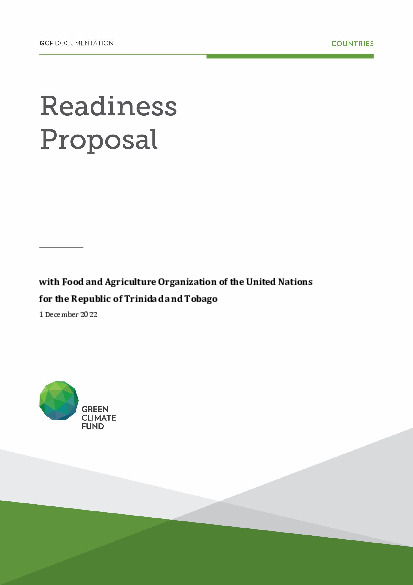Strengthening Adaptation Planning processes and capacity for successful implementation of adaptation actions in the Agricultural and Water sectors of Trinidad and Tobago

Strengthening Adaptation Planning processes and capacity for successful implementation of adaptation actions in the Agricultural and Water sectors of Trinidad and Tobago
Like many other Small Island Developing States (SIDS) in the Caribbean, the southerly located twin-island state of Trinidad and Tobago is already experiencing the adverse effects of climate change and variability, including increasing temperatures, shifting rainfall patterns, rising sea levels and more intense tropical storms. The agriculture and water sectors, vital to the country’s socio-economic progress, are particularly vulnerable to these impacts and are expected to be disproportionately affected because of rising evapotranspiration rates, saltwater intrusion affecting groundwater resources and arable lands, coastal erosion, declining availability of quality freshwater resources, growing agricultural irrigation demand, reduced crop yields as well as crop loss, among other impacts.
Several barriers hinder the adoption of effective and integrated climate change adaptation measures in the two sectors. A coherent approach to adaptation planning among state and non-state actors through a functioning coordination mechanism is inexistent. There is limited knowledge and skills among state and non-state actors in the water and agriculture sector to back-cast and develop climate scenarios and monitor and report on climate resilience in the water and agriculture sector. Precise data and information on the vulnerability of specific agricultural commodities is scarce and there is no related national documented approach for adaptation specific to value chains prioritized by the Government. Furthermore, private sector investment in climate-resilient production operations is minimal due to a lack of awareness of the value proposition and return on investment potential of adaptation-based ventures. These issues complicate all efforts to mobilize adequate financing from the international community to enable broad-scale climate adaptation of vulnerable groups such as small-scale farmers and watershed users.
Considering these barriers, the main objective of this grant is to build the capacity of stakeholders in Trinidad and Tobago’s water and agriculture sectors to implement, analyze and report on proven adaptation solutions. Activities described in this request are designed to support Outcomes 3.1, 3.2, 3.3 and 3.4 of the GCF Readiness Programme.
The training of 240 Climate Risk Resilience Champions on climate risk identification and management, back-casting and fore-sighting, monitoring and evaluation (Output 3.1.2) will strengthen their capacities to interpret the adaptation modeling results to be generated (Output 3.2.2) and to effectively accompany local communities and organizations in designing, implementing and monitoring riverine or watershed protection restoration and maintenance plans (Output 3.2.4). Further, data will be produced through, up to a ceiling of nine Climate Change Resilience Building Production Units (3.2.1) and the Looped Value Chain (LVC)-specific medium-term adaptation solutions, recommended based on the modeling results (Output 3.2.3), will form the basis for selecting national Adaptation Pathways as per the agreed standard operating procedure as well as for catalyzing private sector investment in climate-resilient operations and unlocking adaptation finance from the international community. As such, a sustainable and integrated business model combining investments among the prioritized LVC to be developed (Output 3.3.1), the enhanced capacity of private sector individuals and entities from the country’s four vulnerability zones to recognize the value proposition and return on investment potential of adaptation-based ventures (Output 3.3.2), and the GCF concept note for a national full-size project, focused on strengthening climate resilience in the agriculture and water sectors (Output 3.4.1) will strongly build on Output 3.2.3. Key deliverables from the aforementioned activities are the Validated framework document for medium-term adaptation in the agriculture and water sectors (Deliverable 3.2.3.1), Five validated investment plans for adaptation-based ventures within prioritized LVC (Deliverable 3.3.1.2(b)) and the Cost-benefit analyses for adaptation actions report (Deliverable 3.2.1.1) which provide an evidential basis to adopt adaptation solutions.
The main direct beneficiaries of this proposal are officers of the Ministry of Planning and Development, the Ministry of Agriculture, Land and Fisheries and the Water and Sewerage Authority as well as selected farmers, community groups and private sector individuals and entities. Different stakeholders (institutional, private, and civil society) within the agriculture and water sectors will be mobilized in the inception phase. Gender dimensions have been integrated throughout the project, to ensure that sector-specific gender-based roles, opportunities, and constraints in the context of climate change adaptation are adequately reflected in the knowledge products, as well as to ensure that diverse viewpoints are represented, and different types of actors’ capacity is strengthened.